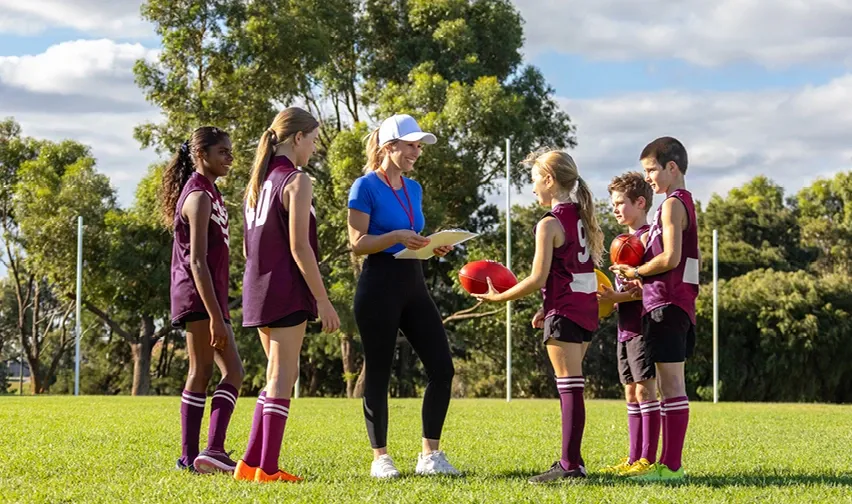
Sport Integrity Australia’s (SIA) first annual survey in the Positive Behaviours in Sport Study has revealed the vast majority of Australian athletes and coaches feel that sport is safe, fair, and enjoyable for everyone.
But the report also highlights the importance of education and awareness to combat existing integrity threats.
The inaugural survey heard from more than 1,200 individuals in early 2025, across 64 sports, with a focus on two cohorts of sport participants: athletes and coaches aged 15 and above.
|
Our latest news, resources, podcasts, courses and webinars:
|
SIA’s Acting Head of Sport Engagement, Alexis Cooper, was encouraged by the finding that most athletes and coaches surveyed (91% and 89% respectively) believe their sport is safe and fair for everyone.
“This is a great outcome and shows that we’re on the right track to ensure sport is a positive environment for all participants,” Ms Cooper said.
Importantly, the survey shows that those who have engaged with SIA’s education programs are more confident in accessing integrity resources and more likely to believe their sport is safe and fair.
— Alexis Cooper, Sport Integrity Australia Acting Head of Sport Engagement
“This reinforces the value of our ongoing work in education, policy development, and collaboration with sporting organisations.
“But there’s always more work to be done, especially around supporting people in sport to speak up if they see or experience negative behaviour.
“While the majority of athletes and coaches do call out poor behaviour, the survey results show that some barriers to formal reporting still exist, for reasons such as: they believed it wasn’t serious enough; that it wouldn't be taken seriously; or they didn’t know how or where to report.”
The intent of the Positive Behaviours in Sport Study is to measure the integrity knowledge and behaviours of participants in Australian sport, to help inform SIA’s education and integrity programs.
“Identifying the integrity risks in sport early is the first step to addressing them. This yearly survey will enable us, in collaboration with the Australian sport sector, to identify behavioural trends and to proactively address potential threats to safe and fair sport,” Ms Cooper said.
SIA constantly moves to respond to evolving threats to integrity in sport, including partnerships with federal law enforcement bodies, increased stakeholder engagement, tailored education programs, and upgrades to online services.
“We prioritise safety across all levels of sport and in 2025 we have focused our education program on building awareness of positive coach-athlete relationships and addressing poor behaviour between athletes,” Ms Cooper said.
Recent examples include:
- SIA’s partnership with the Australian Sports Commission and the Western Australian Institute of Sport to launch a world first eLearning course to help guide safe and effective coaching of young athletes
- the release of education resources with international partner We Ride Together to raise awareness of healthy and unhealthy relationship indicators between coaches and athletes
- the campaign “Sport is for Every BODY” to counter body shaming in sport for children and young people
- a new face-to-face workshop for young athletes on their rights and responsibilities in sport
- the development of a new eLearning course for young athletes, in partnership with the eSafety Commissioner, on expected behaviours, bystander interventions and reporting
- the establishment of a new Youth Advisory Reference Group to bring young people’s input and perspective on SIA initiatives.
The results of the annual survey have established a valuable baseline for the 5-year study, with the next survey in early 2026 to be expanded to include sport administrators and parents.
Read the Snapshot here.
Additional key findings:
- Approximately 3-in-4 athletes (72%) and coaches (77%) believe their club or organisation addresses poor behaviour that occurs.
- Athletes feel supported by their coaches, with 97% saying their coach respected their physical health and 94% their mental health.
- Although SIA warns that no supplement is 100% safe for athletes to use because of contamination risks for doping, 40% of all athletes took a sports supplement in the past 12 months. That rises to more than 1-in-2 for athletes at state level sport or above.
- 57% who took a sport supplement said it was either not batch-tested, or they didn’t know if it was batch-tested.
- Body-shaming (7%), verbal abuse (7%) bullying (5%) and racism (4%) were among some of the poor behaviours that athletes said they had experienced over the previous 12 months. The majority of poor behaviour came from fellow athletes.
- The study looked at illicit drug and alcohol use in Australian sport, with illicit drug use at club or organisation events or venues far less common (1-in-10) than the excessive consumption of alcohol (1-in-3) at club or organisation events or venues.